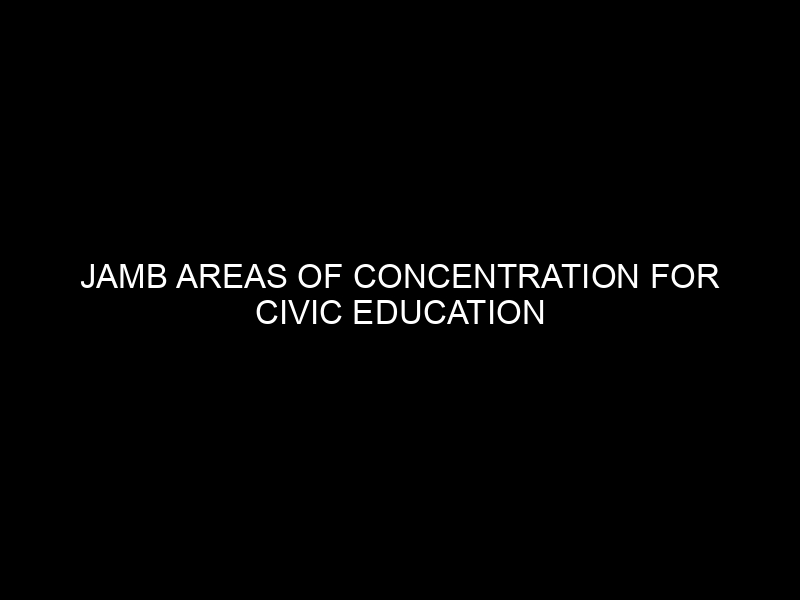As we embark on the journey to prepare for the Joint Admissions and Matriculation Board (JAMB) examinations for the year 2024/2025, it’s essential to have a clear understanding of the areas of concentration for each subject. In this article, we will delve into the specific areas of concentration for Civic Education, providing detailed insights, frequently asked questions (FAQs), and valuable tips to help you excel in this critical examination.
Understanding Civic Education
Civic Education is a vital subject that plays a significant role in shaping responsible and informed citizens. It focuses on imparting knowledge about the rights, duties, and responsibilities of individuals in society, as well as promoting values such as democracy, rule of law, and good governance. In JAMB examinations, Civic Education evaluates candidates’ understanding of these fundamental concepts and their ability to apply them in real-life situations.
Areas of Concentration for Civic Education
To excel in the JAMB Civic Education examination for the 2024/2025 academic year, it is crucial to be well-prepared in the following areas of concentration:
1. Citizenship Education
Candidates should have a firm grasp of the concept of citizenship, including the rights and responsibilities of citizens in a democratic society. This encompasses knowledge of voting rights, civic participation, and the importance of being an active and responsible citizen.
2. Fundamental Human Rights
An understanding of fundamental human rights is essential. This includes knowledge of the Universal Declaration of Human Rights, the rights to life, liberty, and security of person, freedom of speech, and protection from discrimination. Candidates should also be able to identify instances of human rights violations.
3. Constitution and Legal Framework
Familiarity with the Nigerian Constitution and the legal framework governing the country is crucial. This includes knowledge of the structure of government, the separation of powers, the role of the judiciary, and the functions of various government institutions.
4. Governance and Democracy
Candidates should be well-versed in the principles of good governance and democracy. This includes understanding the electoral process, the role of political parties, and the importance of transparency, accountability, and the rule of law in a democratic society.
5. Social and Environmental Issues
A comprehensive understanding of contemporary social and environmental issues is necessary. Candidates should be aware of issues such as climate change, poverty alleviation, gender equality, and social justice. They should also be able to analyze the impact of these issues on society.
6. Civic Engagement and Advocacy
Candidates should know how to engage in civic activities and advocacy for positive change. This includes understanding the importance of civil society organizations, volunteering, and peaceful protests as tools for societal improvement.
Frequently Asked Questions (FAQs)
Q1: What is the format of the JAMB Civic Education examination?
A1: The JAMB Civic Education examination typically consists of multiple-choice questions, where candidates select the correct answer from a list of options. It may also include essay questions that require candidates to provide in-depth explanations and analyses of civic-related topics.
Q2: How can I prepare effectively for the Civic Education examination?
A2: To prepare effectively for the Civic Education examination, consider the following tips:
- Review your textbooks and class notes thoroughly.
- Solve past JAMB questions and practice with mock tests.
- Create a study schedule to cover all the areas of concentration.
- Seek clarification from your teachers or instructors on topics you find challenging.
- Join study groups to discuss and learn from your peers.
Q3: Are there any recommended textbooks or study materials for Civic Education?
A3: Yes, there are several recommended textbooks for Civic Education, including:
- “Civic Education for Senior Secondary Schools” by C. C. Dibie
- “Civic Education” by A. Adeyemi and O. Adeyinka
- “Nigeria and Civic Education” by A. B. Oladipo
Conclusion
In conclusion, success in the JAMB Civic Education examination for the 2024/2025 academic year requires a thorough understanding of the areas of concentration outlined in this article. Citizenship education, fundamental human rights, the constitution and legal framework, governance and democracy, social and environmental issues, and civic engagement are all vital topics to focus on. Additionally, diligent preparation, practice, and a commitment to learning will be key to achieving a high score in this examination. Good luck with your preparations, and may you excel in your JAMB Civic Education examination!

